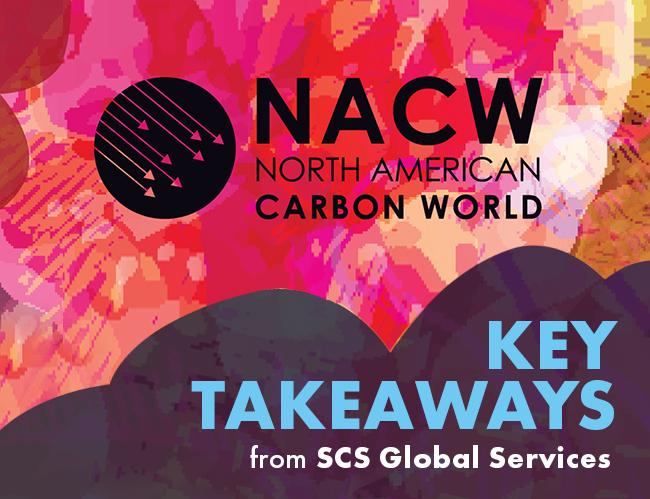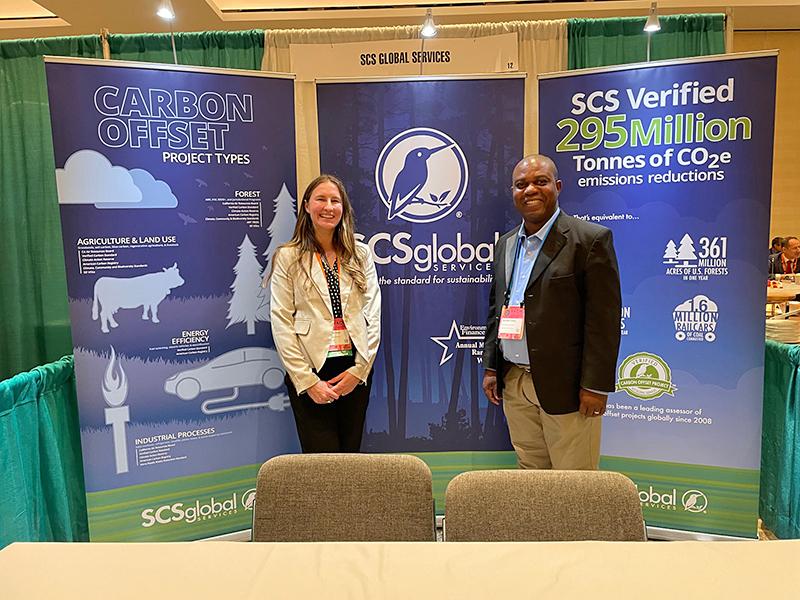Key Takeaways From NACW 2022
By: Christie Pollet-Young and Contributing Authors
April 15, 2022
The 19th annual North American Carbon World (NACW) 2022 Conference, held from April 6-8 in Anaheim, California, provided an opportunity for leading climate professionals throughout North America to gain actionable insights for bold climate solutions. Professionals from around the world attended, including our SCS Greenhouse Gas (Carbon Offset) Verification Program staff.
NACW 2022 was an excellent time to meet again in-person after the long pandemic break from live events, and very timely as the world raises its ambitions to meet climate change goals. Attendees shared the common goal of identifying how we could work to reduce emissions with more urgency and at a larger scale, with energy propelled from COP26.
SCS Global Services exhibited at the show and reconnected with long-time colleagues and friends in the carbon mitigation community. We also met many new participants—a hearty welcome to the new cadre of project developers, buyers, and brokers! Here are a few key takeaways that we will all leverage:
- Scale: The carbon market is growing faster than ever before. There is a much-needed increased enthusiasm among corporates and governments to meet sustainability goals. To meet this demand, scalability, education, and an increase in resources across the board will be essential. We continue to work with these entities globally to meet their Environmental, Social and Governance (ESG) or Nationally Determined Contributions (NDC) goals of the Paris Agreement.
- Soil: Regenerative agriculture and soil carbon projects have arrived. The number of these projects are increasing, and more methodologies for these projects are on the horizon. Up-and-coming schemes and registries of every size are developing methodologies and protocols related to agriculture and land management projects. This means we are likely to see more agricultural related offsets scaling up with grouped projects. SCS is staying nimble to ensure that we are prepared to work with new project types, while staying true to our rigorous work and high standards.
- Innovation: New technologies using lidar and remote sensing are complementing traditional project development and verification approaches. As these tools get developed, it’s imperative that all the players in the carbon reduction community continue to adhere to the criteria and standards that make for quality carbon offsets. Another innovation we’re seeing is the tokenization of carbon credits via blockchain technology – also known as carbon credit-backed non-fungible tokens (NFTs). While this approach does create the transparency and accountability necessary to increase liquidity in the carbon markets, there will still be the need for rigorous verification to be integrated into the process in order to maintain credibility.
- Quality: Verification services will remain vital in the carbon industry to uphold the integrity of carbon credits during this time of extraordinary growth. Many investors were at the show and continue to be most interested in high quality carbon offsets that ensure permanence and real mitigation of greenhouse gas emissions.
- All of the Above: In addition to individual projects, grouped projects, nesting, and jurisdictional approaches are all being implemented and fine-tuned through peer-reviewed consultation to meet global climate goals. These different approaches allow for more project types to have access to verification and achieve real benefits from it. For example, grouped projects promote scaling up by allowing a combination of similar projects into one project for verification. Jurisdictional approaches help facilitate high forest conservation carbon offset projects, while also delivering co-benefits that meet some of the Sustainable Development Goals (SDGs).
With over 296 million tonnes of CO2e verified, SCS has been voted Best Verification Company several times over, providing high-quality validation and verification services for projects and methodologies around the globe. Carbon offset project types we verify include Agricultural, Forest, and Other Land-Use (AFOLU), Methane Gas Capture and Reduction (in Cattle, Mines, and Landfills), Ozone-Depleting Substance, Energy, Industry, Blue Carbon, and more. You can see a map of carbon offset projects verified by SCS here.
As we start to see some of these trends trickling into the market, for those organizations impacted, we recommend reaching out to SCS if you have a new methodology or project type, or if you’re looking to scale up.
Contributing Authors from SCS: Kenneth Zame and Heather Rosa
Media Contact:
Nikki Helms
Senior Marketing Manager
nhelms@scsglobalservices.com



